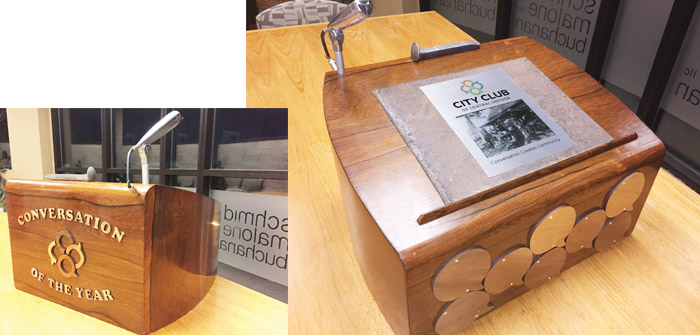(Photos above | Courtesy of City Club of Central Oregon)
The City Club of Central Oregon has unveiled the trophy for its new “Conversation of the Year” award, which will be presented in October to recognize the civic conversation that best reflects the Club’s mission “to build a conscious and civic minded community through dialog, education and research that results in responsible civic engagement.”
Nominations can be made by anyone by emailing their nominations to joey@cityclubco.org , to any City Club board member or to any past president or online at www.cityclubCO.org. To nominate a conversation simply identify the conversation, its key participants and why you believe that conversation best reflects City Club’s mission.
The trophy’s features emphasize the importance of civic engagement throughout Central Oregon’s history. It is fashioned in the form of a lectern, complete with antique microphone, to symbolize City Club’s role in providing a voice for community perspectives. Those perspectives are represented by the four “conversation bubbles” that make up City Club’s logo, which adorns the front of the lectern in wood from four species of trees indigenous to Oregon.
The trophy celebrates historic conversations of significance, including one depicted in a 1912 photograph that is etched on one of the surfaces of the lectern. That photo shows sign-bearing suffragists gathered on the porch of the Drake Lodge, which stood above Drake Park.
The photo includes Sara Ehrgott (Sara Bard Field), a well-known poet and organizer of the Votes for Women campaign. In December of that year, women in Bend became the first Oregon women to vote in local elections. It would be another eight years before women received that same right nationwide through ratification of the Nineteenth Amendment to the U.S. Constitution.
Some conversations evolve over time as the community responds to changing economic and social conditions. One evolving conversation involves the competing uses of the Deschutes River for irrigation, urbanization, recreation, wildlife, and aesthetics. The trophy recognizes such discussions by displaying a steel plate across the top of the lectern that was part of the original fish gate for the Pilot Butte Canal diversion. This fish gate was replaced in 2004 by newer fish screens to satisfy more demanding environmental standards. Stewardship of the Deschutes will, no doubt, continue to be a topic of ongoing conversation.
The scope and pace of civil discourse in Central Oregon has grown and diversified much like its economy. Once focused on timber, those discussions now include recreation, education, livability, conservation, medicine, start-ups, science, and technology. In homage to that history, the crest of the trophy is adorned with a spike from the Shevlin-Hixson logging railroad.
In the early 1930s, the S-H combined its logging camps into a town of over 700 people that moved by rail. Known as Shevlin, the town had its own church, post office, tavern, store, and school. The rail town was originally set up at Fremont Summit, then moved to locations near Chemult and Gilchrist. There were times that the post office sent a truck to deliver mail to the town, only to find out it had moved.
Each year, the name of the winning conversation (and the participants in that conversation) will be engraved on the lectern. In 100 years, the community will reflect on those conversations and decide once-and-for-all, with perfect hindsight, whether those conversations were worthy of City Club’s recognition. Until then, City Club will continue its support for civil conversation to create a better community.
The trophy is sponsored and designed by the law firm of Schmid Malone Buchanan LLC and made possible by contributions of parts, craftsmanship, and lore from the Deschutes County Historical Society, Bill Smith, Martin Hansen, The Tower Theatre, Bend-LaPine School District, and Donald and Terri Defoe of Central Oregon Trophies.
Joey Drucker, Executive Director
541-633-7163
info@CityClubCO.com
www.cityclubco.org




